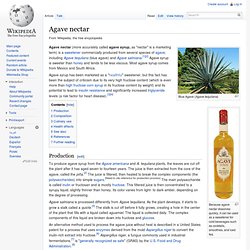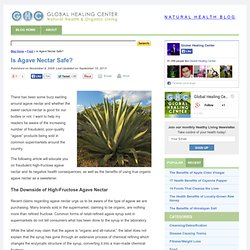

The Truth About Agave. Not as Healthy as You May Think By John Kohler A relatively recent trend in raw food preparation is the use of agave syrup (also called agave nectar) as a sweetener in raw recipes. I am often asked about my views on this sweetener. When I first switched to a raw food diet in 1995, agave syrup was unknown and was NOT USED IN RAW FOODS! I first learned about agave syrup back in 1999 or 2000 at a trade show for the health food industry, which I attend regularly to keep up with the latest in the health and nutrition field. I asked several questions, got some samples, and inquired on how the company processed the agave syrup.
There are several raw food snack bars that say “RAW” but have ingredients like cooked cocoa powder (that can’t be raw) and cashew nuts (most of which are not truly raw). My answer to the question, “Is agave nectar good for us?” 1. Manufacturers take the liquid portion of the agave plant and “boil” it down, thus concentrating the sugar to make it sweet. 2. 3. 4. A. B. C. Agave nectar. Blue Agave (Agave tequilana) Because agave nectar dissolves quickly, it can be used as a sweetener for cold beverages such as cocktails, smoothies, and iced tea.

Agave nectar (more accurately called agave syrup, as "nectar" is a marketing term) is a sweetener commercially produced from several species of agave, including Agave tequilana (blue agave) and Agave salmiana.[1][2] Agave syrup is sweeter than honey and tends to be less viscous. Most agave syrup comes from Mexico and South Africa. Agave syrup has been marketed as a "healthful" sweetener, but this fact has been the subject of criticism due to its very high fructose content (which is even more than high fructose corn syrup in its fructose content by weight) and its potential to lead to insulin resistance and significantly increased triglyceride levels (a risk factor for heart disease).[3][4] Production[edit] Agave salmiana is processed differently from Agave tequiliana.
Composition[edit] Culinary use[edit] Health effects[edit] Is Agave Nectar Safe? There has been some buzz swirling around agave nectar and whether the sweet cactus-nectar is good for our bodies or not.

I want to help my readers be aware of the increasing number of fraudulent, poor-quality “agave” products being sold in common supermarkets around the country. The following article will educate you on fraudulent high-fructose agave nectar and its negative health consequences, as well as the benefits of using true organic agave nectar as a sweetener. The Downside of High-Fructose Agave Nectar Recent claims regarding agave nectar urge us to be aware of the type of agave we are purchasing. Many brands sold in the supermarket, claiming to be organic, are nothing more than refined fructose. While the label may claim that the agave is “organic and all-natural,” the label does not explain that the syrup has gone through an extensive process of chemical refining which changes the enzymatic structure of the syrup, converting it into a man-made chemical fructose. - Dr. References: Beware of the Agave Nectar Health Food Fraud. © 2021 - Privacy - Terms.
